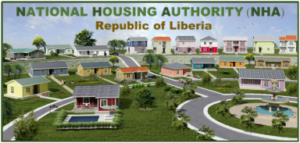MONROVIAMLIBERIA-Habitat for Humanity (H4H) has committed to exploring new and innovative ways that would help expand the influence and impact of low-income market in Liberia, all in an effort of making housing affordable and accessible to all Liberians.

An architectural design for the NHA envisage project.
John Mucheru, H4H’s Capital Markets and financial inclusion specialist, said that his institution through its partnership with the National Housing Authority (NHA) will continue working to ensure that the goals of both institutions are achieved.
Mr. Mucheru, who spoke at a round-table event held at NHA’s headquarters in Monrovia, pledged to support a diverse market development intervention focused on cross-cutting approaches, including the design of financial products for home improvement and incremental building, design of non-financial construction assistance models, and linking different housing market actors to support the expansion of affordable housing.
The round-table discussion was the climax of a two-week assessment of selected Microfinance Institutions (MFIs), and housing firms that offer affordable housing innovations tailored for low-income households. H4H International supported the initiative under the auspices of Cities Alliance Liberia Country Program.
As a facilitator of the process, H4H committed itself to support development of skills of the NHA and other public sector institutions, and the private sector partners to ensure availability of innovative housing solutions.
Research reveals that 70 percent of the population in Monrovia, known as the wettest capital in the world, is living in the informal settlements. And due to the poor citywide drainage systems, the residents are continuously affected by erosions and river flooding.
To meet the growing need for housing, basic services and infrastructure, interventions are needed on community level, market level as well as improving the policies—a situation that H4H, Cities Alliance and the NHA are currently tackling.
It was noted, however, that a solid plan of joint efforts was the first step towards improving lives of many. This led to a five-year comprehensive urban upgrading program, known as the Liberia Program, drafted by the Cities Alliance.
It is being implemented in partnership between Habitat for Humanity, NHA, Slum Dwellers International, YMCA, UN-Habitat and Women in Informal Employment. These organizations have joined forces to support Monrovia and to upgrade the growing slum areas.
H4H Chief of Party, Mathew Ndote, said the entity’s vision is a world where everyone has a decent place to live—this makes Liberia no exception.
“This focus on adequate housing is rooted in the belief that housing plays a central role in the economy and well-being of people,” Ndote said, adding that the current construction rate of 35 units per year is far below the needs of a rapidly growing population in Liberia.
“According to the official data, seven out 10 people living in the ‘greater Monrovia’ are exposed to conditions that are harmful to their health, safety and prosperity,” he said.
The H4H official believes that a private sector approach is needed to support the public sector efforts and help communities in addressing the growing housing need of 512,000 new dwellings and another 144,000 existing dwellings requiring repair and maintenance by 2030.
According to Ndote, adequate, safe and affordable housing is linked to increased stability and a sense of dignity for the home’s owners and their families.
He highly commended that the NHA to take a bold step and refocus its efforts on supporting the vulnerable and low-income households, the majority of whom live in urban slums.
On behalf of participating microfinance institutions, BRAC-Liberia Managing Director for Microfinance, Silent Gonondo, lauded the opportunity to increase housing microfinance offerings and meet the overwhelming demand for affordable housing microfinance loans.
On behalf of the housing firms, the CEO of Alternative Roof, Emmanuel Johnson, appreciated the NHA’s assessment exercise.
Es-Samir Bropleh, NHA Slum Upgrading Unit Coordinator, reaffirmed his organization’s commitment to provide sustainable solutions for the majority of the poor people, who for many years have been excluded by the mainstream financial providers and housing mortgages.
Bropleh then encouraged selected institutions to make best use of the opportunity to develop and fine-tune their housing solutions and serve the overwhelming low-income market.
At the end of the assessments and after proper evaluations, NHA selected BRAC-Liberia Microfinance and Foundation for Women, while on the housing supply side, Alternative Roof, a local micro enterprise specialized in manufacturing of white wash; Clawilkee Enterprises, specialized in production of clay bricks; Nationwide Bricks Company and Limited Power of Attorney (LPA) specialized in building materials and merchandise credit for formally employed households, were selected.

